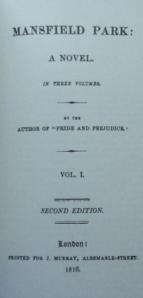
So, I don’t usually do book reviews on this blog, but Jane Austen’s Mansfield Park is so frustrating, I just have to vent about it somewhere. If you haven’t read it or what to avoid spoilers, don’t worry, you can skip this post.
Mansfield Park is a book that has had love and hate poured out on it over the years (probably more hate than love). I didn’t know this when I first read it, I just picked it up because it said ‘Jane Austen’ on the front. And anything by Jane Austen is highly superior, if only because of her adept writing style. But Mansfield Park is, well, frustrating – the first time I read it I thought it was because I didn’t like how it ends (the climax – spoiler! – is exactly the same as in Pride and Prejudice, but with slightly different results), but now I think it’s just frustrating the whole way through.
Pride and Prejudice – Corrupted?
To me, Mansfield Park is like a corrupted version of Pride and Prejudice. In Pride and Prejudice, Elizabeth and Mr. Darcy change for the better because they met each other, but in Mansfield Park it’s like Jane Austen decided to warn all those impressionable young girls out there that people rarely do change. Nobody fundamentally changes in this novel. The main character, Fanny Price, remains steadfastly quiet and shy the whole time, and she is vindicated in the end when her unfavourable opinion of Mr. Crawford turns out to be right (instead of, say, a prejudice like Elizabeth’s opinion was). It’s like Jane Austen’s saying – girls, don’t believe what I said before about men changing because of love for you. They don’t change. And if you think a man is a cad, you’re probably right. Don’t let him convince you otherwise. Which might be perfectly true in reality, and probably is a good lesson for all romance readers out there. But in a novel, where character arcs are important, it requires that what appears to be a character arc for Henry Crawford (and Mary Crawford too), to be chopped off and revealed to be a non-arc. It also requires for there to be no character arc for Fanny, and none for Edmund either.
Also, in Pride and Prejudice, the two central couples are matched up happily. In Mansfield Park, only one couple is, leaving the two leftover spares to misery. In Pride and Prejudice, Mr. Darcy steps up when Lydia runs away with Wickham, and saves the Bennet family from shame. In Mansfield Park, no one saves the Bertram family from shame, though the result is that Edmund is free to marry Fanny.
So, corrupted version of Pride and Prejudice? It seems so to me – even Mary Crawford is like an exaggerated version of what Lizzy would be like if she were a little bit too free with her tongue. (And had more corrupted morals).
And What a Self-Assertive Main Character!
Most of the hate for this book centres around Fanny, and I have to admit, she is a problematic main character. Any time you make a shy, passive person the main character of the novel, you risk making the reader annoyed because they don’t do anything. But while I realize it limits the novel, I don’t absolutely hate Fanny, because I share enough similarities with her. I am a shy introvert myself, who really should take initiative more often, but just don’t have the guts. I will sit back in a room full of noisy people and watch them, and notice all the little ways they are hurting and irritating each other, when they themselves don’t even realize it. I guess I have strong moral principles too, and while I don’t understand her objections to acting in a play, I do understand her objections to accepting the attention of a man she knows plays with women’s hearts. In fact, I really would like to love Fanny. I like it when introverts get their due. Which just leads to frustration when her passivity gets in the way of advancing the plot.
The Honourable Romantic Hero
And another reason the book frustrates me is Edmund. I know he is honourable, upright, and all the rest of it, but he is also bland and boring. More than any of Jane Austen’s other heroes, his good qualities appear to be more informed attributes. She never really makes it clear why Fanny is so in love with him, other than the fact they grew up together and he is the only one who notices her once in a while. Anyway, it is difficult to cheer for a romantic hero who spends ninety-nine percent of the book chasing after another woman who is all wrong for him. And perpetually forgetting Fanny because of it, though Fanny is apparently too used to being taken for granted to care. But the reader notices!
Sorry, No Hope Here
But my biggest frustration is that I have: that there is no hope for Henry Crawford and Mary. This is the way the book has to end, and after re-reading it several times, I see redeeming them would completely ruin the main point of the story. But it is so sad for them! They are likeable people, Jane Austen makes sure of that. They are not like Mrs. Elton in Emma, whom you would love to see being taken down a notch or two. But Henry Crawford abuses women’s affections abominably, and to let Fanny fall in love with him would make it seem like that fault doesn’t really matter. Also, she would probably never make him happy because she doesn’t possess the nerve to stand up to him. If he trotted off to flirt with other women after they got married, she would hardly have the ability to protest that it makes her miserable. So I can’t see the book ending in any other way, but I wish for the Crawfords’ sake that they could somehow learn from their mistakes. That they wouldn’t just let their blindness, bad morals and folly ruin their lives. This leave me with a frustrating, unfinished feeling when I reach the end of the book – and if there has to be more to the story that will tie up these loose ends. As if a sequel is begging to be written.
So there you have it – all my thoughts on this book out on paper. A quick search of Jane Austen sites on the net will show there are many, many more people frustrated with this book, for a variety of reasons. But I will say, I don’t regret reading it, or re-reading it again and again, because it is of Jane-Austen-quality. Her worst book (and I don’t know if this is her worst) is better than many authors’ best. I also really, really want to like Mansfield Park. And large chunks of it are very enjoyable. That, of course, just makes it more frustrating.
What about you? Have you read Mansfield Park, and what did you think of it?
***
Looking for some more romantic reads? Check out my short novellas, Is He Prince Charming? and Paris in Clichés. Or sign up for my author newsletter.
***

What do you think? Comment here!